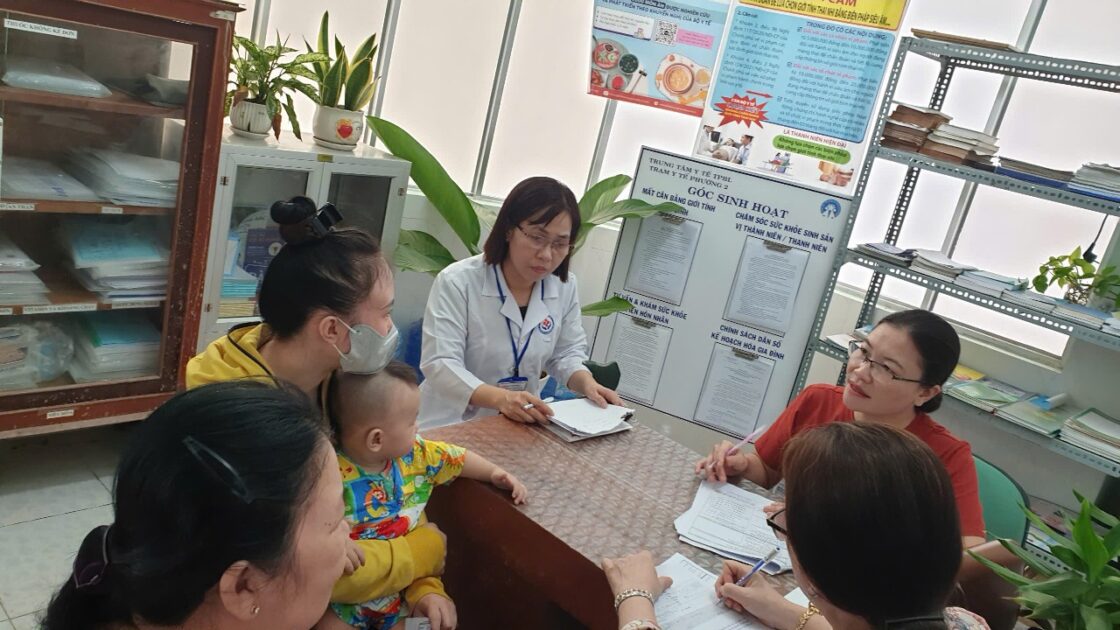By Adam Savelli 1, 2, Alessandra Vaselli 1, Thanh Thi Duong 1, Tuyen Huynh 1, Phuong Thi Mai Tuan 3, Mai Tuyet Truong 3
A partnership between the CGIAR Research Initiatives on Asian Mega-Deltas (AMD) and the Vietnam Ministry of Health, organized by CIAT on behalf of the Alliance of Bioversity International and CIAT, will explore the linkages between human mobility (displacement, migration, planned relocation, immobility) and food and nutrition security (FNS) outcomes in Vietnam’s Mekong Delta. This important collaboration will generate evidence to inform policies and programs that support the food and nutrition security of households increasingly affected by climate-related mobility in the Mekong Delta.
Each year, the National Institute of Nutrition (NIN) technically supports the Center for Disease Control and Prevention (CDC) in conducting a National Nutritional Surveillance (NNS) Survey to understand the state of food and nutrition security within households in all provinces by evaluating the nutrition status of children under 5 years of age, and the state of infant and young child feeding practices (IYCF). The NNS survey’s results are then used to inform local and national policies and programs, especially those targeting the achievement of Vietnam’s National Strategy on Nutrition for 2021-2030 and Vision to 2045 and the National Action Plan on Food Systems Transformation.


Building on an existing partnership between AMD’s research team from The Alliance’s Food Environment and Consumer Behavior lever and NIN, AMD’s deltaic development planning team have been recruited to explore how the relationship between mobility outcomes and household food and nutrition security in Mekong Delta provinces. This unique collaboration responds to a shared acknowledgement by NIN and AMD on the urgency to further research and account for mobility patterns while pursuing efforts for inclusive food and nutrition security.
First, a scoping review of the implications of climate-related mobility for human security in Vietnam’s Mekong Delta was conducted by AMD. The findings were used to identify the following evidence gaps and recommendations for future research, including:
Based on a history of successful collaboration on food systems strengthening and the evidence-based recommendations from AMD’s scoping review on climate-related mobility, NIN agreed to collaborate with AMD by leveraging its sophisticated CDC data collection infrastructure. Further research was performed to facilitate this collaboration, including a series of workshops and technical meetings with NIN staff and other expert stakeholders. These were used to develop a list of mobility indicators with high potential relevance for the food and nutrition security of deltaic households. These indicators and their impact on food and nutrition security have been published in a new Technical report: Using Vietnam’s National Nutrition Surveillance (NNS) survey to explore the relationship between human mobility and food and nutrition security in the Mekong Delta.


AMD and NIN have now developed a “mobility questionnaire” to be included in future NNS Surveys, consisting of questions related to the previously identified mobility indicators and additional nutrition-sensitive questions. Following a series of capacity development workshops for NNS Survey enumerators he questionnaire was piloted in Bac Lieu province in September-October 2024. Bac Lieu was selected as a pilot location due to its high negative net migration rate (-52%, or 6th highest of all 63 provinces in Vietnam) and coastal geography with high exposure to climate-related environmental hazards, including flooding, subsidence, coastal erosion, salination, erratic rainfall, and increasing temperatures. Pending a successful pilot, the mobility questionnaire will be permanently incorporated into future NNS surveys in Bac Lieu, followed by other provinces in Vietnam’s Mekong Delta, and then, nationwide.
The inclusion of mobility questions in the NNS Survey will provide annual, integrated, and longitudinal data to understand how mobility outcomes affect households’ food and nutrition security, and vice-versa. Through an improved understanding of this relationship, CGIAR AMD and The Alliance of Bioversity International and CIAT aim to support NIN and the Government of Vietnam to develop evidence-based policies and programs that enhance food and nutrition security in the face of a changing climate and shifting mobility patterns. The partnership is also supported by the CGIAR Initiative on Climate Resilience, for whom the newly co-produced knowledge and lessons learnt will be of high value for ongoing work to address climate-related vulnerabilities and sustain inclusive, climate-secure adaptation.
Related resources:
